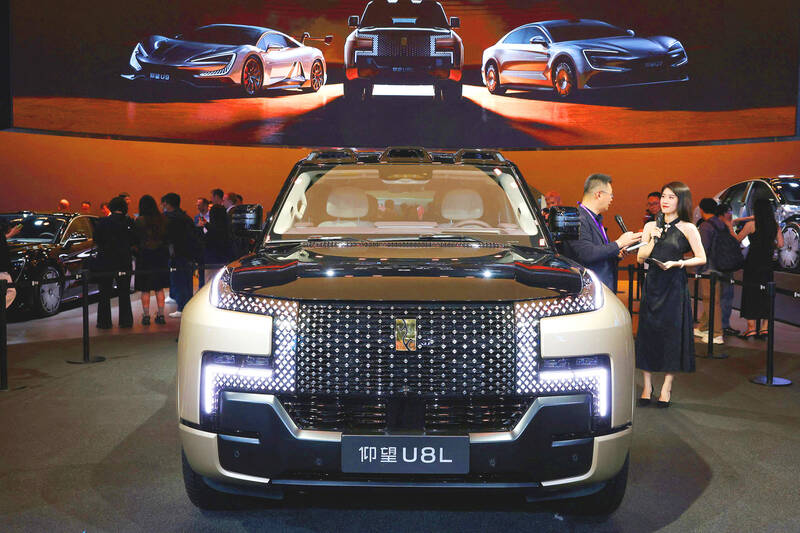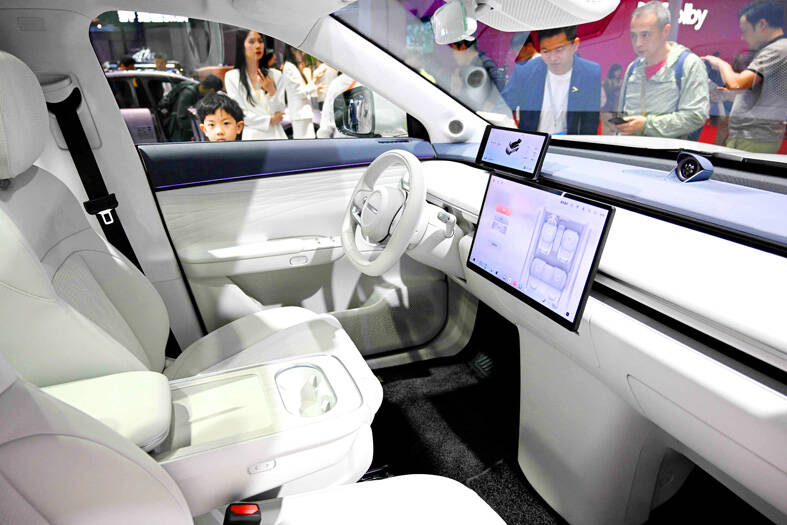Chinese companies such as BYD Co (比亞迪) made their name producing electric vehicles (EV) ahead of the curve, but they have turned to an old-school solution to extend the range of some of their newest models — the gasoline generator.
At the Shanghai International Automobile Industry Exhibition this week, BYD’s luxury Yangwang U8 SUV and other EVs such as Chery’s Exeed ET promised an unusually long range of more than 1,000km.
The secret is a small generator, known as a range extender, which is connected to the vehicles’ batteries and feeds them only when needed.

Photo: Reuters
Because the range extender is not connected to the wheels, the vehicles, known as EREVs, always run in 100 percent electric mode even though they consume gas and emit gases.
This technology grew faster in China last year than any other type of powertrain, the system that propels a vehicle forward.
More than 1 million EREVs were sold, representing a total market share of 6 percent, data from the McKinsey consultancy showed.

Photo: AFP
Range extenders are rare elsewhere at the moment, but that could soon change.
In the US, Stellantis NV plans to offer an EREV version of its star pick-up, the Ram 1500, while its Chinese partner Leapmotor Technologies (零跑) has already launched its C10 SUV in Europe. Volkswagen AG has plans to launch an EREV Scout pickup in the US after unveiling an EREV SUV at Auto Shanghai as part of its renewed push into China. Horse Powertrain, a joint venture between France’s Renault SA and China’s Zhejiang Geely Holding Group Co (吉利控股集團), also presented an engine that can be installed in an electric model.
EREVs fall into the category of rechargeable hybrids, which are seen by manufacturers as a good bet in Europe and North America, where electrification has been slower than expected. They pollute less than gas-powered cars if they are properly charged, while also assuaging driver concerns about range.
According to a survey published by McKinsey on Tuesday, once the concept has been explained, almost one-quarter of customers questioned in Europe and the US said they would consider choosing an EREV as their next car.
“This is a real use identified for the United States, for very American needs,” Stellantis’ Sebastien Jacquet said.
They are suitable for long journeys, but also work well for “pick-ups for towing boats, for example,” Jacquet said.
While an EV has towing capacity, its battery only lasts 100km, he said.
The road ahead is less clear in Europe.
Unlike in the US , there is a planned transition to a 100 percent EV market, AlixPartners managing director Alexandre Marian said, adding that there is a “cut-off point of 2035.”
Some, notably Germany, want exceptions for non-electric but less-polluting motors.
“Who would now invest into new capacities if you know that there’s a natural end to it in 2035?” asked Holger Klein, CEO of German equipment manufacturer ZF. “That’s why we need to solve this very soon.”
Range extenders are a “very good opportunity to reduce the entry cost for people to come to electric mobility,” Volkswagen chief executive officer Oliver Blume said on Tuesday.
However, “in the long term I see the electric mobility as superior”, Blume said.
In a few years battery development would have progressed to the point where those longer ranges will be achievable by pure EVs, he added.

In Italy’s storied gold-making hubs, jewelers are reworking their designs to trim gold content as they race to blunt the effect of record prices and appeal to shoppers watching their budgets. Gold prices hit a record high on Thursday, surging near US$5,600 an ounce, more than double a year ago as geopolitical concerns and jitters over trade pushed investors toward the safe-haven asset. The rally is putting undue pressure on small artisans as they face mounting demands from customers, including international brands, to produce cheaper items, from signature pieces to wedding rings, according to interviews with four independent jewelers in Italy’s main

Japanese Prime Minister Sanae Takaichi has talked up the benefits of a weaker yen in a campaign speech, adopting a tone at odds with her finance ministry, which has refused to rule out any options to counter excessive foreign exchange volatility. Takaichi later softened her stance, saying she did not have a preference for the yen’s direction. “People say the weak yen is bad right now, but for export industries, it’s a major opportunity,” Takaichi said on Saturday at a rally for Liberal Democratic Party candidate Daishiro Yamagiwa in Kanagawa Prefecture ahead of a snap election on Sunday. “Whether it’s selling food or

CONCERNS: Tech companies investing in AI businesses that purchase their products have raised questions among investors that they are artificially propping up demand Nvidia Corp chief executive officer Jensen Huang (黃仁勳) on Saturday said that the company would be participating in OpenAI’s latest funding round, describing it as potentially “the largest investment we’ve ever made.” “We will invest a great deal of money,” Huang told reporters while visiting Taipei. “I believe in OpenAI. The work that they do is incredible. They’re one of the most consequential companies of our time.” Huang did not say exactly how much Nvidia might contribute, but described the investment as “huge.” “Let Sam announce how much he’s going to raise — it’s for him to decide,” Huang said, referring to OpenAI

The global server market is expected to grow 12.8 percent annually this year, with artificial intelligence (AI) servers projected to account for 16.5 percent, driven by continued investment in AI infrastructure by major cloud service providers (CSPs), market researcher TrendForce Corp (集邦科技) said yesterday. Global AI server shipments this year are expected to increase 28 percent year-on-year to more than 2.7 million units, driven by sustained demand from CSPs and government sovereign cloud projects, TrendForce analyst Frank Kung (龔明德) told the Taipei Times. Demand for GPU-based AI servers, including Nvidia Corp’s GB and Vera Rubin rack systems, is expected to remain high,